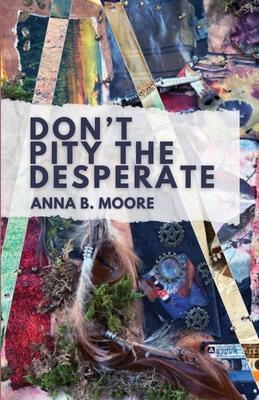Myra is in deep trouble, exactly the sort of trouble American teens find themselves in, here in the centerless middle of endless suburbia, of late stage capitalism, driven by longings she cannot control or decipher. In a voice that rises up out of her deepest insecurities and denials, DON'T PITY THE DESPERATE tracks Myra's progress toward her own truth, or at least a self that is by degrees more survivable, and there is much bravery and beauty in the telling. This deep-hearted, penetrating portrait delivers the thing I want most in any story: the feeling that the writer's life depended, at least a little, in getting it on the page.
-Pam Houston, author of Deep Creek and Finding Hope in the High CountryMoore's kaleidoscopic look at the pain and confusion of early recovery is unapologetically raw and unfiltered. In its conflicted portrayal of the teen rehab experience and the challenges of surrender, DON'T PITY THE DESPERATE reflects on absence, trauma, desire, and desperation, all within the fluid and chaotic state of adolescent identity. The center of this novel is a triad of questions every addict has asked: What would it be like to feel less alone? Is there a God? And what would it take to choose life?
-Tara Stillions Whitehead, author of They More Than Burned and The Year of the Monster
Anna B Moore has the rare, remarkable ability to embody young characters with authenticity and intensity. You open DON'T PITY THE DESPERATE and are instantly immersed, immediately drawn into what is real and true in the lives of these almost-adults. Moore opens a window into the world of teen recovery, a world many don't know much about, and she writes with precision and compassion. There is such love in these pages, such care for these kids. By the end, I was profoundly changed by Myra's story, and by all of the complicated people who'd come so alive on the page.
-Hannah Grieco, editor of Already Gone: 40 Stories of Running Away and And If That Mockingbird Don't Sing: Parenting Stories Gone SpeculativeDon't Pity the Desperate tells the story of Myra, a self-aware teenage girl who perseveres when her father admits her to an inpatient treatment center against her will. Under tight surveillance, Myra must confront both her alcoholism and her compulsion to pull out her hair. She finds hope in faith and confession, two key principles of recovery. As her peers-an ensemble of abused, neglected, and sometimes unrestrained addicts-grow to rely on the solutions offered at Our Primary Purpose, Myra decides to follow the rules. But when her counselor betrays her, her boyfriend rejects her (doesn't he?), and God remains indifferent despite her prayers and devotion, Myra must twist her narrative to move forward. Her quest for love and acceptance is a dark anthem of Gen-X pop culture and an affirmation of the suffering of growing up.
